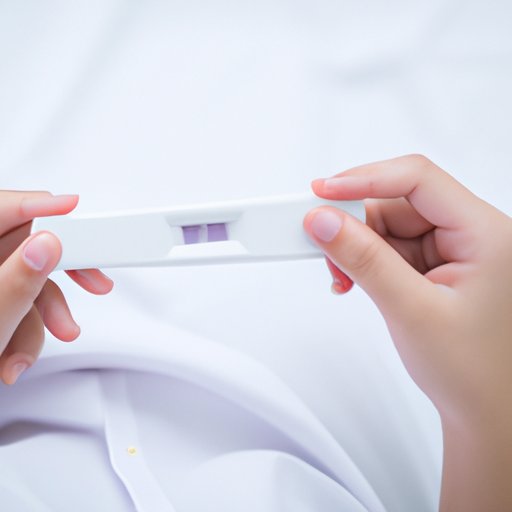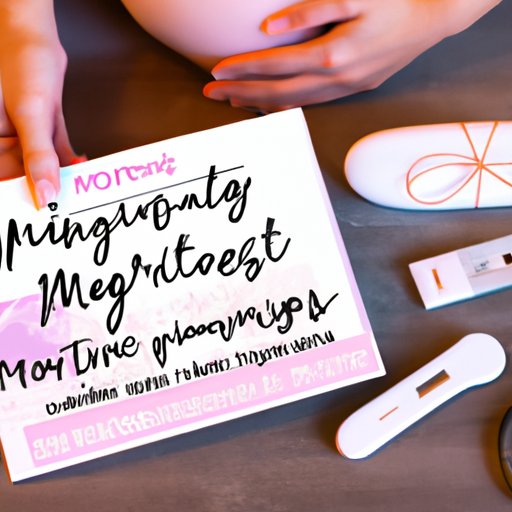
Introduction
Starting a family is a life-altering experience, but it all starts with finding out you’re pregnant. The journey of pregnancy begins with the recognition of pregnancy symptoms by the would-be-mother. In this article, we will provide a comprehensive guide for detecting pregnancy symptoms, signs that you may be pregnant, and when to take a pregnancy test. We will also explain the science behind home pregnancy tests, share insights into common misconceptions, and provide tips on how to manage your emotions during this exciting time.
A comprehensive guide to detecting pregnancy symptoms
When it comes to pregnancy, the first and foremost thing women should look for is the change in their bodies. Pregnancy can show itself through many hormonal and psychological changes. Here are some common physical and emotional symptoms of pregnancy that women may experience:
- Missed period or spotting
- Breast tenderness and swelling
- Nausea and vomiting
- Increased fatigue and tiredness
- Frequent urination
- Cravings or changes in taste
- Mood swings and changes in emotions
It is essential to keep in mind that these symptoms can vary from person to person. While some women may experience everything from the list, others may not encounter any changes in their body beyond a missed period.
If you think you might be pregnant, we recommend keeping a pregnancy journal where you can track your symptoms. This journal can help in detecting early signs of pregnancy.
Early signs of pregnancy: What to look for before taking a test
Some signs that may indicate pregnancy include:
- Implantation bleeding: This is a light bleeding that happens when the fertilized egg implants in the uterus wall.
- Cramping: As the uterus expands to accommodate the growing fetus, a woman may experience mild cramping.
- Mood changes: Hormonal changes may cause mood swings or changes in behavior.
- Changes in appetite: Pregnancy hormones may alter the way some women feel about food and cause cravings or aversions.
- Changes in temperature: A woman’s basal body temperature will remain elevated during pregnancy.
Some early pregnancy symptoms may sound like premenstrual symptoms such as bloating, cramping, mood swings, and breast tenderness.
However, they can be distinguished as early pregnancy symptoms do not go away when a period arrives. To be sure, taking a pregnancy test is the best solution.
Understanding the science behind home pregnancy tests
Home pregnancy tests measure the hCG hormone that the placenta produces after implantation. Once the fertilized egg gets implanted, it starts creating a placenta. This process of creating a placenta also produces the hCG hormone. Home pregnancy tests work by detecting this hormone in urine samples.
Two types of home pregnancy tests can be taken: urine tests and blood tests. Urine tests utilizing midstream, dipstick, or digital tests and can be purchased at pharmacies or drug stores. Blood tests are available from a doctor or clinic and are labelled as quantitative or qualitative tests.
Midstream tests or digital tests used for urine tests can detect pregnancy 14 days after conception. But blood tests can detect this hormone as early as 10 days after conception.
When to take a pregnancy test: The most accurate timeframes
The accurate time to take a pregnancy test may vary from person to person. It depends on several factors such as:
- Duration of menstrual cycles
- Time of ovulation
- The sensitivity level of the test
The best time to take a pregnancy test is one week after a missed period. If you have a shorter menstrual cycle, you should wait at least three weeks after having unprotected sex. Testing too early can yield a false negative result that can cause psychological stress. It would be best if you repeated the test if the first results are negative and if menstruation cycles have not started.
Clearing up common misconceptions about pregnancy testing
There are many myths about pregnancy testing. Here are the facts that debunk some of these:
- Myth: You can’t get pregnant during your period.
- Fact: Pregnancy can happen during your period if you ovulate early in the cycle.
- Myth: Home pregnancy tests are 100% accurate.
- Fact: Home pregnancy tests are not 100% accurate, but the accuracy level is close to 99% when taken on the appropriate day after missed periods.
- Myth: If a pregnancy test shows faint lines, it means you are not pregnant.
- Fact: Faint lines mean you are pregnant as it detects the smallest amount of hCG hormone in the body.
How to stay calm and manage emotions once you know you’re pregnant
It’s natural for women to experience overwhelming emotions once they recognize that they are pregnant. Coping strategies to manage emotions during the early stages of pregnancy include:
- Talking to a supportive friend or family member.
- Expressing emotions by writing in a journal.
- Taking some time to relax and focus on your wellbeing.
- Joining pregnancy groups and forums to discuss common issues.
Notifying your partner and family members of the happy news can be an emotional and challenging task, but we recommend sharing the news early on to gain support as you navigate through the pregnancy.

Pregnancy milestones: What to expect in the first trimester
After testing positive, the first trimester of pregnancy is the most important phase as the baby’s foundation forms. Some physical and emotional changes that women may experience in the first trimester are:
- Increased fatigue and tiredness.
- Mood changes and anxiety.
- Constipation and bloating.
- Morning sickness and nausea.
- Increased hunger and food cravings.
In the first trimester, the fetus develops vital organs such as the heart, lungs, and brain. By the end of the first trimester, the fetus will have all its major body parts.
Conclusion
Once you recognize pregnancy symptoms, detecting an early sign of pregnancy can become much easier. After that, taking a pregnancy test is the most accurate way to confirm pregnancy.
Managing emotions, clearing up misconceptions, and taking care of yourself are essential parts of a healthy pregnancy. Lastly, the first trimester is critical, and growth and development for both personal and child’s brain, organs, and health are essential in this phase.
With this comprehensive guide, we hope it will help future moms navigate through the early stages of pregnancy more accurately and prepare for a healthy and happy pregnancy.





